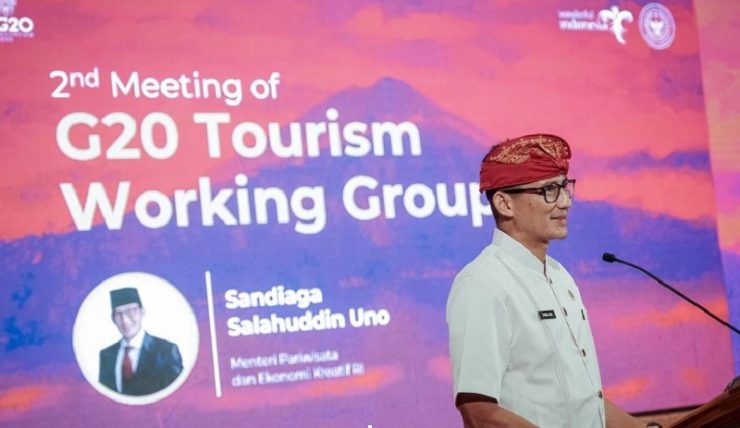IT IS hoped that the 2nd Tourism Working Group (TWG) meeting can produce strategic policies for a more inclusive, resilient, and sustainable economic recovery.
According to the Minister of Tourism and Creative Economy, Sandiaga Uno while giving the opening remarks of the 2nd TWG, at the Grand Hyatt Hotel, Bali, Friday (9/23) said I appreciate the G20 countries that previously (in the first TWG) have shared their respective best practices countries in overcoming global economic challenges, especially in the tourism and creative economy sectors.
“I am very happy to hear that the G20 countries have succeeded in reaching common ground on most of the issues or issues in the Tourism Working Group including highlighting the role of tourism to promote peace and development,” he said.
Tourism and the creative economy themselves are economic drivers and job creators, not only in Indonesia but throughout the world. Prior to the COVID-19 pandemic, tourism was one of the most important sectors in the world economy. It accounts for 10% of global GDP and absorbs more than 320 million jobs worldwide.
Therefore, this potential must be optimized by presenting a variety of strategic policies, especially in strengthening Micro Small and Medium Enterprises (MSMEs) and encouraging community-based tourism that focuses on creating decent jobs in tourism and has significant leverage in realizing a more inclusive and resilient economy.
“Without reducing our respect for the delegates to complete the last mile of the Tourism Working Group meeting at the G20 Summit and reach an agreement on some remaining issues or issues, so as to finalize the Bali Guidlines,” he remarked.
Minister Sandiaga hopes that the delegates can enjoy the natural and cultural beauty of Bali. Moreover, according to TripAdvisor, there is almost no other island in the world that is more alluring than Bali.
“I hope, apart from being a delegate at the G20 meeting, I can also take the time to be a tourist in Bali, and enjoy all the wonders Bali has to offer,” he stated.
Meanwhile, the Chair of the G20 Tourism Working Group, Frans Teguh, expressed his gratitude to the G20 countries who have played an active role in providing valuable views and input on the communique starting from the first Tourism Working Group.
The Tourism Workign Group has agreed that most of the communiqué texts are substantive. These include efforts to promote the recovery of tourism to be more inclusive and resilient, the important role of tourism as a means of world peace and economic development, as well as the synergy between tourism and the creative economy. “We will continue to refine this communique,” Frans noted.
Frans explained that Indonesia has also tried optimally to encourage consensus to finalize the G20 Bali Guidelines which will be the outcome of the G20 Tourism Working Group.
In the G20 Bali Guidelines there are five lines of action including human capital related to work, skills, entrepreneurship, and education, how tourism human resources are able to see market needs and wants, create new jobs, and be able to bring added value from their products or services.
Second, innovation, digitalization, and the creative economy. Focus on how the community is able to be more innovative, creative, and adaptive in entering the digital economy ecosystem order, so that creative economy actors can reach a wider market.
Third, empowering women and youth. Because women and youth in tourism are among the most affected by the pandemic. For that they need proper support.
Fourth, climate action, biodiversity conservations, and circular economy, where the use of energy, land, water, and food resources in the tourism sector can reduce carbon emissions.
And lastly, a policy, governance and investment framework, with a focus on creating more holistic tourism policies and measures to support the four pillars of the line of action.
“We believe that these guidelines are strategic and incorporate the efforts of all member states. And ensure that we don’t just recover after the pandemic and get back to business as usual. But through the five lines of action, we can help ensure that tourism also becomes more inclusive, resilient, and community-based, especially in communities and MSMEs,” concluded Frans. [traveltext.id]
















